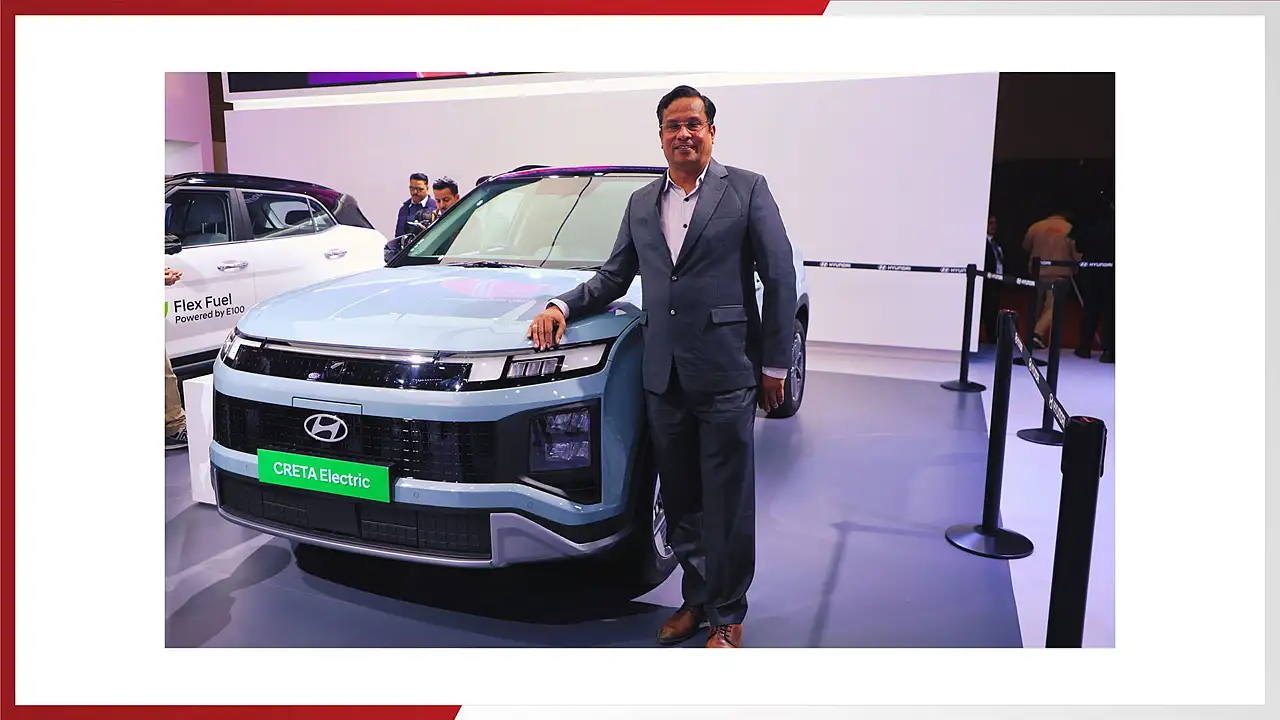
Hyundai Motor India has been making continuous strategic efforts to expand its manufacturing capacity, enhance localisation, and strengthen its electric vehicle (EV) portfolio.
In a discussion with Gopalakrishnan CS, Whole-time Director and Chief Manufacturing Officer, insights emerged on Hyundai’s production strategy, localisation efforts, and sustainability roadmap. The conversation also shed light on the challenges of transitioning to EVs, the role of AI in manufacturing, and Hyundai’s perspective on emerging technologies like hydrogen powertrains.
Manufacturing Expansion: Strengthening Capacity To Meet Demand
Hyundai’s new Talegaon plant is a crucial part of its expansion, adding to the production strength of its existing Chennai facility. The Talegaon plant will initially have a capacity of 170,000 units, which will later be increased to 250,000 units. Combined with the Chennai plant’s current 824,000-unit capacity, Hyundai India’s total production will reach 1.1 million units annually. This expansion aims to meet growing domestic demand while also catering to Hyundai’s export markets across 80+ countries.
Electrification & The Role Of The Creta EV
Hyundai’s electrification strategy has evolved, beginning with the launch of the Kona Electric, followed by the Ioniq 5. Now, the company has introduced its first locally manufactured mass-market EV – the Creta EV. With around 92% localisation on the Creta EV, Gopalakrishnan views this as a potential game-changer stating that it offers advanced Hyundai Motor Corporation (HMC) technology, a premium design, and safety features at a very balanced price point.

Despite the enthusiasm around the Creta EV, Hyundai acknowledges that EV penetration in India remains low, currently at around 2.5%. The demand for electric vehicles depends heavily on government policies, charging infrastructure, and customer acceptance. While Hyundai will continue investing in electrification, the company is keeping an eye on evolving consumer preferences and market readiness.
Export Strategy & Market Expansion
Hyundai’s exports contribute to 20% of its total production, with a primary focus on emerging markets. While Hyundai remains open to exporting the Creta EV, Gopalakrishnan emphasised that this would depend on country-specific policies, charging infrastructure, and tariffs.
When asked about charging infrastructure and its global status, he refrained from commenting on whether Europe or the US had a superior charging network. However, Hyundai remains focused on scaling up EV production and working with stakeholders to improve charging accessibility in India.
Strengthening India’s Supplier Ecosystem
Hyundai has been actively localising production in India, with 90-95% of its vehicle components now sourced locally. The purpose of localisation is two-fold—reducing costs and de-risking the supply chain. Hyundai has a structured evaluation process to ensure components meet global quality standards before full-scale localisation.
The focus is on high-tech parts such as panoramic sunroofs, radars, and TPMS (Tyre Pressure Monitoring Systems). By collaborating with global suppliers through joint ventures and technical agreements, Hyundai is not only meeting local demand but also positioning India as a key export hub for components.
AI & Digitalisation In Manufacturing
Artificial Intelligence (AI) and Industry 4.0 technologies are playing an increasing role in Hyundai’s manufacturing processes. The company has implemented AI-powered vehicle assembly line checks, where an operator simply scans a car body to verify the presence and specifications of over 30 external components. This reduces human fatigue, enhances accuracy, and minimises defects.
Hyundai has also invested in predictive analytics for maintenance, connecting 2,200 critical machines through an IoT network. This generates 40 billion data points, which are processed through machine learning algorithms in R and Python to predict failures before they occur, significantly reducing downtime.
When asked about whether AI-based predictive diagnostics could be integrated into connected vehicles, Gopalakrishnan agreed that it was technically possible. Using driving data, Hyundai could identify potential failures based on individual driving patterns, much like how AI is already being used in predictive maintenance on assembly lines.
Hydrogen Technology: A Future Possibility For India
Hyundai is also investing in hydrogen technology, having recently partnered with IIT Madras to develop a hydrogen ecosystem. The company already has hydrogen-powered vehicles like the Nexo running globally but acknowledges that India’s infrastructure for hydrogen refuelling is currently inadequate.
Despite this, Hyundai is keeping all options open. The company is equipped with technologies for petrol, diesel, CNG, hybrid, EVs, and hydrogen fuel cells. If government policies and infrastructure support hydrogen adoption, Hyundai will be prepared to introduce these technologies in India.
Logistics & Cost Optimisation
Hyundai has been working on optimising its logistics costs through digital solutions, packaging optimisation, and route efficiency improvements. The company has increased rail transportation for vehicle distribution, though Gopalakrishnan did not disclose specific growth figures.
Hyundai’s approach includes leveraging analytics tools to optimise inventory management, reducing unnecessary stockpiling and improving supply chain efficiency.
Hyundai’s Premiumisation & Future Outlook
While Hyundai is known for its mass-market cars, the company has been shifting towards premiumisation. The discontinuation of models like the Santro reflects Hyundai’s strategic focus on higher-end vehicles. Gopalakrishnan reaffirmed that Hyundai will not miss any market opportunities, but its primary focus is now on premium models with high-tech features. This aligns with its global push towards higher-margin vehicles and a strong emphasis on advanced technology.
Hyundai’s expansion, localisation, and electrification strategies reflect its commitment to India as a long-term manufacturing and innovation hub. While the Creta EV is expected to strengthen Hyundai’s EV portfolio, the company is also hedging its bets by developing hydrogen and hybrid technologies.
The Talegaon plant and enhanced AI-driven manufacturing processes position Hyundai as a leader in smart manufacturing and digitalisation. However, the road ahead is not without challenges, particularly in charging infrastructure, supply chain risks, and fluctuating demand for EVs.
Photography: Mohd Nasir
Also Read
Hyundai Creta Electric Review: A Pragmatic Leap Towards Electrifying A Winning Recipe